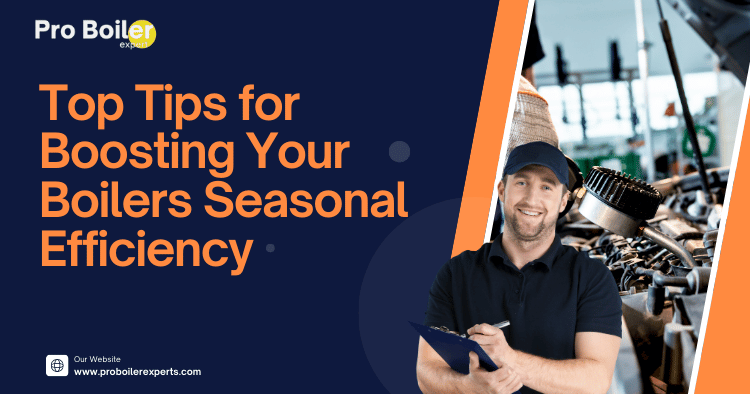Table of Contents
- Understanding Seasonal Efficiency
- Regular Maintenance is Key
- Optimize Your Thermostat Settings
- Insulation Matters
- Upgrade to a Modern Boiler
- Utilize Smart Technology
- Consider Your Fuel Type
- FAQs
Understanding Seasonal Efficiency
Seasonal efficiency is critical for anyone relying on a boiler to keep their home warm during the colder months. It measures how effectively a boiler converts fuel into heat over an entire heating season. The Seasonal Efficiency Rating (SEER) can help you understand your boiler’s performance. The higher the rating, the better your boiler is at saving energy and reducing costs.
To put this into perspective, consider the following table that outlines common boiler types and their average seasonal efficiency ratings:
| Boiler Type | Average SEER Rating |
|---|---|
| Conventional Boiler | 60-80% |
| Condensing Boiler | 90-98% |
| Electric Boiler | 95-100% |
| Biomass Boiler | 80-90% |
| Hybrid Boiler | 85-95% |
Investing in a boiler with a higher seasonal efficiency can lead to significant savings on energy bills and a reduced carbon footprint. For more detailed information, check out the U.S. Department of Energy’s Guide to Heating Systems.
Regular Maintenance is Key
Regular maintenance is one of the most effective ways to boost your boiler’s efficiency. Just like your car needs an oil change, your boiler needs periodic check-ups to ensure it runs smoothly. Here are some maintenance tips to keep your boiler in top condition:
- Annual Service: Schedule a professional inspection and service at least once a year. Technicians can identify potential issues before they become major problems.
- Bleed Radiators: Air trapped in radiators can reduce heating efficiency. Bleed your radiators regularly to ensure the hot water circulates properly.
- Check for Leaks: Regularly inspect your boiler for any signs of leaks or corrosion. Even small leaks can lead to significant energy losses.
Regular maintenance not only enhances efficiency but also extends the lifespan of your boiler, saving you money in the long run. For tips on professional maintenance services, see the top 5 benefits of professional boiler maintenance services.
Optimize Your Thermostat Settings
Adjusting your thermostat settings can lead to substantial energy savings. Here are some tips to optimize your settings effectively:
- Set a Consistent Temperature: Keep your home at a consistent temperature, ideally around 68°F (20°C) during the day. Lowering it by just a few degrees at night can lead to significant savings.
- Use Programmable Thermostats: Consider investing in a programmable thermostat that automatically adjusts the temperature based on your schedule. This ensures you’re not heating an empty home.
A small adjustment in your thermostat can lead to an annual savings of about 10% on your heating bills. For more information on smart thermostats, visit Energy Star’s website.
Insulation Matters
Proper insulation is essential for maintaining a warm home and improving your boiler’s efficiency. Here are a few areas to focus on:
- Attic Insulation: Ensure your attic is well-insulated to prevent heat from escaping. This simple step can significantly reduce heating costs.
- Wall Insulation: Check for gaps or inadequately insulated walls. Insulating your walls can further minimize heat loss.
- Draught Proofing: Seal windows and doors to stop cold air from entering your home. Simple draught-proofing can create a more comfortable environment and reduce heating demands.
By improving your home’s insulation, you reduce the workload on your boiler, enhancing overall efficiency. For more on energy efficiency, explore the top energy efficiency tips for boiler installation.
Upgrade to a Modern Boiler
If your boiler is over 15 years old, it might be time to consider an upgrade. Modern boilers are designed to be more energy-efficient, with many models boasting seasonal efficiencies of over 90%. Here’s why an upgrade may be worth the investment:
- Energy Savings: Newer models use less fuel to generate the same amount of heat, translating to lower utility bills.
- Environmental Impact: Modern boilers emit fewer greenhouse gases, making them a more eco-friendly choice.
- Advanced Technology: Many newer models come with smart features that can optimize performance and improve user control.
When considering an upgrade, consult with a professional to identify the best options for your home. For insights on different boiler types, see the ultimate boiler size guide.
Utilize Smart Technology
Smart technology can significantly enhance your boiler’s efficiency. Here are some smart solutions to consider:
- Smart Thermostats: As mentioned earlier, these devices adapt to your schedule and optimize heating, leading to energy savings.
- Smart Zoning Systems: These allow you to heat specific areas of your home rather than the entire space, which can be more efficient.
- Remote Monitoring: Some modern boilers come with remote monitoring options that notify you of performance issues or maintenance needs.
Incorporating smart technology can help you make more informed decisions about your heating needs while maximizing efficiency. For the latest in smart boiler technology, visit top 5 smart boilers revolutionizing home heating 2024.
Consider Your Fuel Type
The type of fuel your boiler uses can impact its efficiency. Here’s a breakdown of common fuel types:
- Natural Gas: Generally the most efficient and cost-effective option.
- Oil: Typically less efficient than gas, but may be necessary in certain areas.
- Electricity: Electric boilers can be highly efficient, but energy costs may vary significantly based on your location.
- Biomass: An eco-friendly option, but efficiency can vary based on the type of biomass used.
When evaluating your fuel type, consider the availability and cost of each option. For a comprehensive guide on different types of boilers, check out top 5 benefits of biomass boilers for eco-friendly heating.
FAQs
Q: How often should I service my boiler?
A: It’s recommended to service your boiler at least once a year to ensure optimal performance.
Q: What is the best temperature to set my thermostat?
A: A comfortable setting is around 68°F (20°C). Lowering it at night can save additional energy.
Q: How can I tell if my boiler is efficient?
A: Check the Seasonal Efficiency Rating (SEER) on your boiler. Higher ratings indicate better efficiency.
Q: Are there any government incentives for upgrading my boiler?
A: Yes, many regions offer rebates or tax credits for energy-efficient home upgrades. Check with local energy authorities for details.
By implementing these tips, you can significantly boost your boiler’s seasonal efficiency, leading to lower utility bills and a more comfortable home.
Remember, a little effort goes a long way when it comes to energy savings! If you have any more questions or need further guidance, don’t hesitate to reach out. Happy heating!





